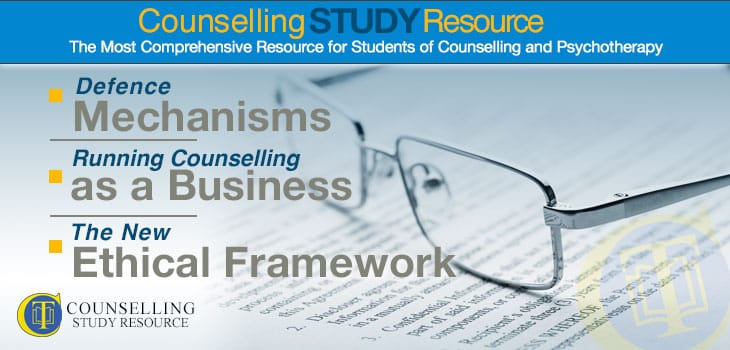Returning to Study
Rory and Ken discuss the challenges and opportunities of returning to study after a break, offering various tips:
- Keep calm – you will be given time to settle back into an existing course, or to find your way around at a new one.
- Try to enjoy the chance to meet new people.
- Use a diary to help you plan your time.
- Share your experiences on the Counselling Tutor Facebook group (see ‘Links and Resources’).
- Reflect on what going back to study means to you.
Counselling Student Library
On-demand access to a rich lecture library covering theory, skills, and professional development for counselling students—Mapped to the UK awarding body criteria
“The Student Library has been BRILLIANT, I can’t recommend it enough!
It has been a lifeline in helping me prepare for practice and my first clients. If you’re considering it, go-for-it, it’s absolutely worth it!”
Kelly – Graduated and now in practice.
Defence Mechanisms
Sigmund Freud was the first to describe defence mechanisms, which are subconscious processes we put into place when we find a situation difficult.
The psychodynamic view of the human psyche suggests there are three parts of personality: the id, ego and super-ego. To compare the personality to an iceberg, the id is below the water and so we are unconscious of it, while the ego and super-ego appear above the water and so in our consciousness.
The id drives our primitive and instinctive urges (it is our ‘wild child’); Freud believed we are born only with the id, and that the ego and super-ego develop at three to five years of age. The id remains throughout life and demands our immediate attention.
The super-ego, meanwhile, is our ‘super-parent’. Comprising the conscience and the ideal self, it strives for perfection and is driven by values introjected by our parents and society. Falling short of its rigorous standards leaves us feeling guilty.
The ego is part of the id that has been modified by the outside world and has the unenviable task of acting as communicator between the ‘wild child’ and the ‘super-parent’. In this role, it strives for realism so that we can fit into – and be accepted by – the social world.
We use defence mechanisms to protect ourselves from anxiety and/or guilt – when we feel threatened, or when the id or super-ego becomes too demanding. Freud originally identified seven defence mechanisms:
- repression – pushing away a thought or feeling (which might then leak out in a ‘Freudian slip’)
- denial – refusing to accept that something exists or has happened
- projection – taking an aspect of self and putting it onto someone else
- rationalisation – creating an acceptable but incorrect explanation for a situation
- intellectualisation – thinking about something logically without any attached emotion
- reaction formation – doing the opposite of what you would like to do
- regression – acting as a child might if they did not get their own way.
Rory illustrates all these defence mechanisms with real-life examples.
The concept of defence mechanisms was later developed further by Anna Freud (Sigmund’s daughter) and others; they took a wider and deeper view of these, identifying more mechanisms.



